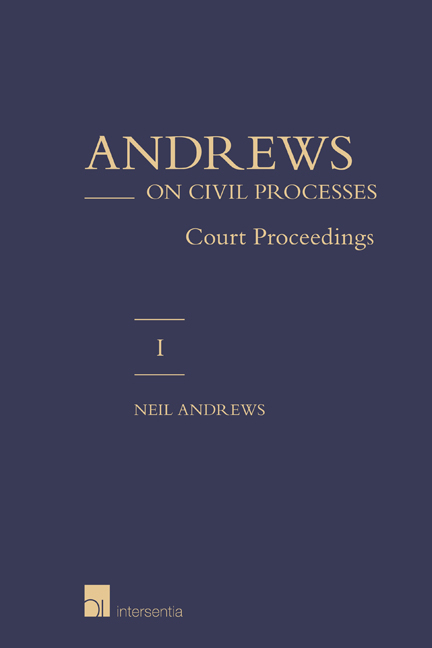Book contents
- Frontmatter
- Dedication
- Epigraph
- Preface
- Contents
- Table of Cases
- Table of Statutes
- Table of Statutory Instruments
- PART I INTRODUCTION TO THE FORMS OF CIVIL JUSTICE
- PART II COMMENCEMENT OF COURT PROCEEDINGS AND PREPARATION FOR TRIAL
- Chapter 4 The Six Phases of Court Proceedings
- Chapter 5 Commencement and Service
- Chapter 6 Pleadings and Parties
- Chapter 7 Counterclaims and Set-Off
- Chapter 8 Limitation of Actions
- Chapter 9 Case Management and Procedural Discipline
- Chapter 10 Pre-Trial Termination of Actions Without Settlement: Interim, Summary, Default, Preliminary and Striking Out Procedures
- Chapter 11 Disclosure
- Chapter 12 Privileges
- Chapter 13 Experts
- PART III END-GAME: TRIAL, APPEAL, FINALITY AND ENFORCEMENT
- PART IV COSTS AND FINANCING OF LITIGATION
- PART V SPECIAL PROCEEDINGS
- PART VI PRINCIPLES OF CIVIL LITIGATION
- PART VII THE EUROPEAN CONTEXT
- Select Bibliography
- Index to Volumes I and II
Chapter 11 - Disclosure
from PART II - COMMENCEMENT OF COURT PROCEEDINGS AND PREPARATION FOR TRIAL
Published online by Cambridge University Press: 13 December 2017
- Frontmatter
- Dedication
- Epigraph
- Preface
- Contents
- Table of Cases
- Table of Statutes
- Table of Statutory Instruments
- PART I INTRODUCTION TO THE FORMS OF CIVIL JUSTICE
- PART II COMMENCEMENT OF COURT PROCEEDINGS AND PREPARATION FOR TRIAL
- Chapter 4 The Six Phases of Court Proceedings
- Chapter 5 Commencement and Service
- Chapter 6 Pleadings and Parties
- Chapter 7 Counterclaims and Set-Off
- Chapter 8 Limitation of Actions
- Chapter 9 Case Management and Procedural Discipline
- Chapter 10 Pre-Trial Termination of Actions Without Settlement: Interim, Summary, Default, Preliminary and Striking Out Procedures
- Chapter 11 Disclosure
- Chapter 12 Privileges
- Chapter 13 Experts
- PART III END-GAME: TRIAL, APPEAL, FINALITY AND ENFORCEMENT
- PART IV COSTS AND FINANCING OF LITIGATION
- PART V SPECIAL PROCEEDINGS
- PART VI PRINCIPLES OF CIVIL LITIGATION
- PART VII THE EUROPEAN CONTEXT
- Select Bibliography
- Index to Volumes I and II
Summary
INTRODUCTION
This chapter concerns two topics: first, the system of documentary disclosure; secondly, the main ‘privileged’ exceptions to the party's obligation to disclose relevant documents, legal advice and litigation privileges.
‘Disclosure’ serves four main functions: (i) it can achieve equality of access to information; (ii) it can facilitate settlement of disputes; (iii) it avoids so-called ‘trial by ambush’, that is, the situation when a party is unable to respond properly to a surprise revelation at the final hearing; and (iv) it assists the court in reaching accurate determinations of fact when entering judgment on the merits.
PRELIMINARY CONSIDERATION AFFECTING PRE-ACTION AND NON-PARTY DISCLOSURE
Pre-action disclosure can encourage and enhance settlement, and it can reduce litigation expenses by advancing the stage at which disputants focus upon the essential matters in dispute. The American Law Institute/UNIDROIT Principles state that potential parties, litigants, and the court should each enjoy appropriate ‘access to information’. However, as a matter of principle, there are three counter-constraints: (i) the problem of ‘fishing’, that is, an applicant's ‘roving’ request for evidence to make out a contemplated claim which is wholly speculative; (ii) non-parties’ reasonable expectations in maintaining confidentiality and privacy (whether in respect of their own private information, or to satisfy duties of confidentiality owed to fourth parties); (iii) the danger that judicially administered orders for pre-action disclosure can increase the expense of resolving disputes.
PRE-ACTION PROTOCOLS
As mentioned at 4.03 ff, the CPR (1998) system introduced a set of ‘preaction protocols’ which prescribe ‘obligations’ which the prospective parties and their legal representatives must satisfy before commencing formal proceedings. Pre-action protocols are intended to promote efficient exchange of information between the prospective parties, including pre-action disclosure of ‘essential’ documents held by each side. All such disclosure is subject to the restriction that the material can only be used for the purpose of the immediate prospective proceedings.
PRE-ACTION JUDICIAL ORDERS FOR DISCLOSURE
CPR 31.166 contains a general power for the court to make a pre-action documentary disclosure order against any type of prospective defendant.
Before this new rule, statute had confined the scope for pre-action documentary disclosure to proceedings for personal injury and death.
- Type
- Chapter
- Information
- Andrews on Civil ProcessesCourt Proceedings, pp. 261 - 286Publisher: IntersentiaPrint publication year: 2013



